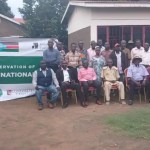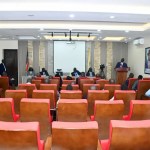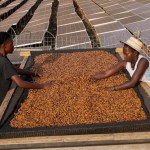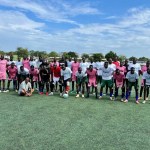(JUBA COUNTY) – More than 70 internally displaced persons (IDPs) living in Mangateen camp in Juba have completed training in soap and shampoo production, equipping them with skills designed to improve self reliance and economic independence.
The vocational programme trained participants in producing liquid soap, bar soap and shampoo, with the aim of enabling conflict affected families to generate income and support themselves. Organisers believe the initiative can contribute to local economic growth and reduce dependence on humanitarian aid.
The training was conducted in two groups. The first group of 33 participants completed a four month course between September and December last year. The second group undertook six months of training from April to September this year, bringing the total number of graduates to 73.
At the graduation ceremony held this week, Mary Nyagani, Chairlady of the Mangateen camp, said the skills will provide displaced families with opportunities to create livelihoods and strengthen community resilience. She emphasised that income from small-scale production could help parents provide for their families and send children to school.
“These skills give families the chance to support their children’s education and meet their basic needs,” Nyagani said. “The ability to contribute to the future of their children is a source of pride and inspiration for many parents.”
Agang Judith Alimas, Director of Vision for Humanity South Sudan, described the programme as an important part of transitional justice and recovery, noting that it combined vocational training with psychosocial support.
“Learning a skill is valuable, but healing from trauma is equally important,” she said. “The psychosocial support received during the programme helped participants cope with life challenges, build resilience and find hope for the future.”
Bona Deng, Chairperson of the Parliamentary Committee on Peace and Reconciliation, encouraged the graduates to turn their skills into small enterprises. He said that with even modest financial assistance, the soap producers could expand into small businesses, enabling them to earn a steady income.
“By putting your training into practice, you can create opportunities for yourselves and others,” Deng said. “This is the kind of initiative that can help rebuild lives and communities.”
The programme received financial and technical support from the Kingdom of the Netherlands, the United Nations Peacebuilding Fund and the United Nations Development Programme (UNDP).
The organisers hope the initiative will be replicated in other displacement camps across South Sudan, where thousands of people remain without stable livelihoods. Small scale industries such as soap production are seen as accessible entry points for income generation, especially in urban areas where demand is steady.
Training Programme Overview
| Training Group | Duration | Participants | Skills Acquired |
|---|---|---|---|
| Group 1 | Sep – Dec 2024 (4 months) | 33 | Liquid soap, bar soap, shampoo |
| Group 2 | Apr – Sep 2025 (6 months) | 40 | Liquid soap, bar soap, shampoo |
| Total | — | 73 | Vocational and psychosocial support |


















































